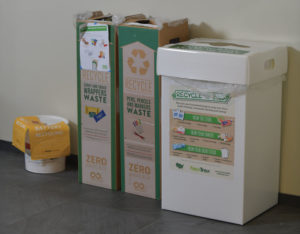More Than a Buzzword
Sus•tain•abil•i•ty
(suh-stey-nuh-BIL-i-tee)
noun
1. The ability to be sustained, supported, upheld, or confirmed.
2. One of the most overused, yet frequently misunderstood buzzwords of the 21st century.
Just what exactly is “sustainability,” anyway? At Hope College, it appears the meaning is well defined: it is a coordinated, multifaceted, campus-wide effort to engage and impact the Hope community — and beyond — by meeting our consumer needs in a responsible manner without jeopardizing future generations…all within the context of our Christian beliefs.
Hope’s faith component is exemplified in its new, official “Commitment to Sustainability” statement. The statement was crafted last year by the Campus Sustainability Advisory Committee — more commonly known as “the Green Team” — submitted to President Matthew A. Scogin ’02 and approved by the Administrative Council. It is being published in print here for the first time. It reads:
“Hope College strives to create a future in which our planet and all its inhabitants flourish. Rooted in the Christian faith, we embrace our calling to care for the Earth and we celebrate restoring God’s creation and sustaining our future as synergistic goals. We commit to build a sustainable world that promotes the holistic well-being of future generations and affirms the dignity of all people. By means of our academic curriculum, our scholarly work, our student life programs, the management of our campus, and our engagement with the local and global community, we educate students for a sustainable future that values the rights and opportunities of every individual, each of whom is created and loved by God. We humbly embrace this calling and shoulder these responsibilities with joy.”
“Hope is unapologetically Christian, though not a place where faith is forced on anyone, and our faith calls us to care for creation,” says Dr. Steve Bouma-Prediger ’79, the Leonard and Marjorie Maas Professor of Reformed Theology and co-chair of the “Green Team,” which was co-founded 14 years ago by Bouma-Prediger and since-retired faculty colleagues Dr. John Cox ’67 (English) and Dr. K. Gregory Murray (biology), and subsequently co-chaired by Bouma-Prediger and now-retired Director of Operations Greg Maybury. As Bouma-Prediger notes, “Into this statement we have consciously woven a concern not just for the natural world, but for social justice as well.”

And the concerns are paying off. Hope recently was named one of most environmentally responsible colleges in America by the prestigious Princeton Review in its Guide to Green Colleges: 2021 Edition and has held a STARS Silver rating since 2017 from the Association for the Advancement of Sustainability in Higher Education (AASHE), the most widely recognized platform in the world for assessing such measures.
What is Hope doing to achieve such status? Tracking electric and gas consumption. Installing LED lights in most residence halls and academic buildings. Following green purchasing policies. Upgrading furnaces and water heaters, with costs offset by rebates. Trayless dining to reduce food waste. Composting by the Grounds Department and campus dining facilities. Replacing residence hall windows with better insulated models and adding insulation to cottage attics. Custodial staff using green cleaning products. Planting trees every Arbor Day and Earth Week, and an ongoing inventory of trees on campus and in Holland through its online app TreeSap. A successful drive to collect 500 pounds of plastic bags and film in less than six months, in partnership with the wood composite company Trex, will result in a park bench made from the materials to be donated to the college.

Hope even installed solar panels atop the Keppel Carriage House that houses its electric golf carts to power them, a 48-inch mower and handheld grounds equipment. That project is especially significant, as it involved faculty, staff and students from all corners of the campus.
The system was designed by first-year Hope engineering students in the Introduction to Engineering class. “We wanted a project substantial enough to require a reasonable amount of electricity, big enough to have an impact, but not so big that it was beyond what students would be able to accomplish in one semester,” explains Dr. John Krupczak of the Hope engineering department. “It was a great real-world example.” The Green Team and Hope’s Office of Sustainability provided oversight, and a team from the Physical Plant installed the system. Thus far, more than 150 kWh of energy has been produced.

Yes, Hope has an Office of Sustainability. It is headed by Michelle Gibbs, who is so passionate about the calling that she opened a phone book in college and looked up the word “Environmental” in order to locate a summer internship. “I believe almost every department on campus has some kind of initiative that they’re working on, and I really think our students want to see this,” she says. “It may be a younger generation thing. You see so many of them getting on board with it, getting involved in climate action talks, waste reduction activities.
“They’re always asking questions. This past year we saw 44 applicants for just 10 internship positions.”
Gibbs and Susan Ipri Brown, assistant professor of engineering instruction and director of the ExploreHope program that brings K-12 students to campus for learning experiences, recently received a $43,544 grant from the Great Lakes Fishery Trust Great Lakes Stewardship Program for youngsters to engage in hands-on stewardship and mentorship with college students. “When I look for grants for outreach, I think, ‘Where are areas that we can complement Hope College’s strengths and unique features?’” Ipri Brown says.
“Sustainability is a natural fit for that because you’ve got K-12 students who have a natural affinity for the environment,” she says. “They love to explore and know the world around them, want to be good little stewards even at that age, and you’ve heard about how phenomenal our Hope students have been in this area. This grant will assist in helping to mentor the younger students.”
Who knows? The experience could impact them the way it affected Jacob VanderRoest ’21, co-president of Hope Advocates for Sustainability (HAS), an elite team of about 14 paid student representatives who seek to energize fellow students about such issues as recycling, energy usage and water conservation. He says he had no particular interest in such matters before enrolling at Hope.
“No, going into college, this was not on my radar at all,” says VanderRoest, a chemistry major with a minor in geology. “I took a class called Earth and Ethics taught by Dr. Bouma-Prediger all about the biblical reasons to get involved in sustainability and be a caretaker for Earth. So it was Hope College that introduced me to this concept; then Hope Advocates for Sustainability provided the vector for me to really try to make a difference.”
VanderRoest conceived and spearheaded the idea of “Less Meat Mondays” as a means to emphasize the advantages of a plant-based diet. “Meat would be served for students who prefer it, but plant-based meals will be highlighted,” he explains. “A plant-based diet has a huge impact in terms of reducing carbon emissions, reducing our water footprint, and the dining team was incredibly receptive to the idea. That was just an awesome, awesome experience to demonstrate that you can have an impact at Hope College if you really strive and put forth the effort.”
VanderRoest and his fellow co-president, Zoe Gum ’21, both graduated from Hope in the spring, yet they are continuing to serve ex-officio with HAS until new leadership can be installed for 2021-22. “Even though I’m not technically at Hope anymore, Hope Advocates for Sustainability was one of the most important organizations I was in,” he says. “I think it was just as beneficial as undergraduate research, because you have the opportunity to make really tangible change on campus.”
While Hope’s sustainability grades continue to improve, Krupczak, for one, believes slow and steady improvement is the key.
“I’m a big advocate of sustainability, but doing some gigantic project that fails is not going to help anybody,” he says. “You need to build in stages, one step at a time, and learn from each step.
I think that’s the correct way to make the transition, and we’re making progress.”


